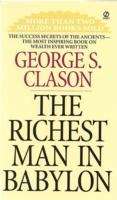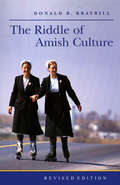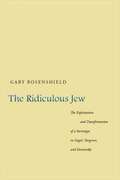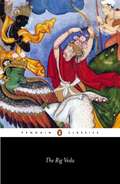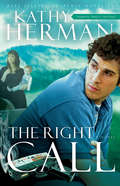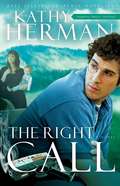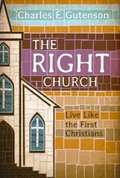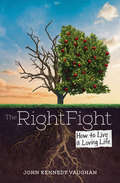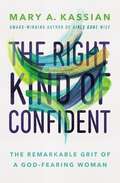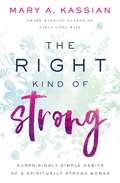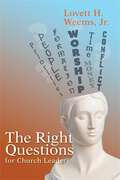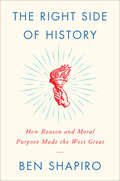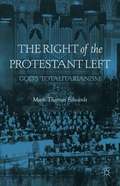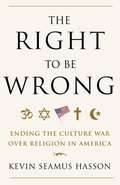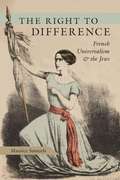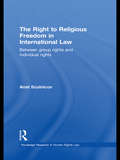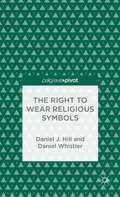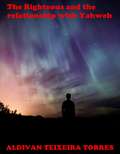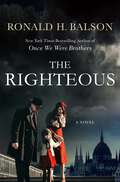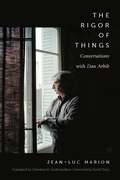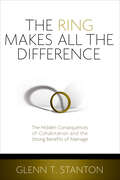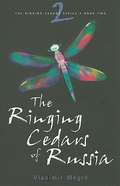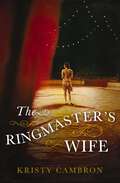- Table View
- List View
The Richest Man in Babylon
by Margaret Drabble George S. ClasonCountless readers have been helped by the famous 'Babylonian parables', hailed as the greatest of all inspirational works on the subject of thrift, financial planning and personal wealth. In simple language, these fascinating and informative stories will set readers on a sure path to prosperity and its accompanying joys.
The Riddle of Amish Culture (Center Books in Anabaptist Studies)
by Donald B. KraybillRevised edition of this classic work brings the story of the Amish into the 21st century.Since its publication in 1989, The Riddle of Amish Culture has become recognized as a classic work on one of America's most distinctive religious communities. But many changes have occurred within Amish society over the past decade, from westward migrations and a greater familiarity with technology to the dramatic shift away from farming into small business which is transforming Amish culture. For this revised edition, Donald B. Kraybill has taken these recent changes into account, incorporating new demographic research and new interviews he has conducted among the Amish. In addition, he includes a new chapter describing Amish recreation and social gatherings, and he applies the concept of "social capital" to his sensitive and penetrating interpretation of how the Amish have preserved their social networks and the solidarity of their community.
The Ridiculous Jew
by Gary RosenshieldThis book is a study devoted to exploring the use of a Russian version of the Jewish stereotype (the ridiculous Jew) in the works of three of the greatest writers of the nineteenth century. Rosenshield does not attempt to expose the stereotype-which was self-consciously and unashamedly employed. Rather, he examines how stereotypes are used to further the very different artistic, cultural, and ideological agendas of each writer. What distinguishes this book from others is that it explores the problems that arise when an ethnic stereotype is so fully incorporated into a work of art that it takes on a life of its own, often undermining the intentions of its author as well as many of the defining elements of the stereotype itself. With each these writers, the Jewish stereotype precipitates a literary transformation, taking their work into an uncomfortable space for the author and a challenging one for readers.
The Rig Veda
by Wendy DonigerThe earliest of the four Hindu religious scriptures known as the Vedas, and the first extensive composition to survive in any Indo-European language, the Rig Veda (c. 1200-900 BC) is a collection of over 1,000 individual Sanskrit hymns. A work of intricate beauty, it provides a unique insight into early Indian mythology, religion and culture. This selection of 108 of the hymns, chosen for their eloquence and wisdom, focuses on the enduring themes of creation, sacrifice, death, women, the sacred plant soma and the gods. Inspirational and profound, it provides a fascinating introduction to one of the founding texts of Hindu scripture - an awesome and venerable ancient work of Vedic ritual, prayer, philosophy, legend and faith.
The Right Call
by Kathy HermanIt's summer in Sophie Trace, and Ethan Langley has returned home from college, eager to grow his friendship with Vanessa Jessup and her infant son, Carter. And Vanessa's parents, Police Chief Brill Jessup and her husband, Kurt, approve: Ethan is thoughtful, kind, hard-working, and ambitious.Before Ethan has time to settle in, a series of random shootings leaves someone he loves dead. The police have no suspects. While Ethan scrambles to make sense of it, a coworker takes him aside and divulges a shocking secret that could break the case--but would imperil the lives of those Ethan's come to love. Then when the coworker is discovered dead, Ethan is pulled still deeper into the mystery. Going to the police with what he knows endangers Vanessa and Carter ... yet not telling them is just as dangerous. He's been dealt a risky hand in a game for which he doesn't know the rules. Will he make the right call?
The Right Call (Sophie Trace Trilogy, Book #3)
by Kathy HermanWith information that could solve a series of murders but endangers the girl he loves, a college boy grapples with what to do--and whom to trust.
The Right Church: Live Like the First Christians
by Charles E. GutensonMany of us long for a faith like the first Christians. We speak ideally of the earliest followers of Jesus and use them authoritatively for current church doctrine and practice. But do we know what that means? What happens if we actually learn what early church leaders wrote? What might they be able to teach us?A variety of contemporary, hot-button issues have surprising context to the early church. In the modern era, church leaders can learn from early church thinking on key ethical issues such as poverty and wealth, war, creation care, social issues and more. Take a peek into a lost era and discover surprisingly relevant insights into contemporary issues.Includes a downloadable study guide.
The Right Fight: How to Live a Loving Life
by John Kennedy VaughanFrom the author of Shields of Strength, &“a gift that could radically change every interaction and relationship you have&” (Reg Lloyd, Pastor, Praise Church, Beaumont TX).What is the opposite of love? Many would say hate, but studying the Bible reveals that it is actually fear. Fear leads us to make harmful decisions and live unproductive, unhappy, and unfruitful lives. Love is the key to a fruitful life, but love must be more than a feeling. Love must be an action, a choice. Choosing love over fear is the most powerful choice we can make.Kenny Vaughan brings this timeless discussion back to the forefront of our spiritual exploration by teaching us to view life as a fruit-bearing tree. When we feed the roots with love, the tree flourishes, and we enjoy the blessings that grow upon it. If we deprive our roots, however—if we allow fear to cut us off from love—then the whole tree withers and dies. Utilizing both Scripture and anecdotes from modern life, The Right Fight teaches us how to tend our roots, grow our fruit, and, through the grace of God, cast fear out for good.&“The Right Fight will hold your attention and challenge your perspective and application of love.&”—Reg Lloyd, Pastor, Praise Church, Beaumont TX
The Right Kind of Confident: The Remarkable Grit of a God-Fearing Woman
by Mary A. KassianWhat if we stopped placing our confidence in the things of this world—and instead put our trust in the only one who is truly trustworthy?As you begin to apply each chapter&’s material, you&’ll discoverthe true meaning of confidence,the difference between negative fear and positive fear, andhow to turn the Enemy&’s tool of fear on its head with strong confidence.Be honest: Who among us isn&’t plagued with fears, insecurities, and self-doubt?Popular wisdom says the solution is to simply believe more strongly in ourselves. But award-winning author and speaker Mary A. Kassian explains that the way to combat fear is with more fear—fear of a different kind.In this follow-up to her popular book The Right Kind of Strong, Kassian again draws on her vast biblical knowledge to show us a better way to navigate life. She compares the Bible&’s definition of confidence with the world&’s well-worn self-help formulas and sets us on the right path.Whether you&’re seeking more confidence or already feeling full of it, when you lean into a source of confidence that is unchanging, firm, and trustworthy, you&’ll become more like the bold, courageous woman God created you to be.&“In the fear of the Lord one has strong confidence.&” (Proverbs 14:26)
The Right Kind of Strong: Surprisingly Simple Habits of a Spiritually Strong Woman
by Mary A. KassianAward-winning author Mary Kassian provides readers a biblical guide to becoming the strong, resilient, capable women God created them to be.Our culture teaches us that it's important for women to be strong. The Bible agrees. Unfortunately, culture's idea of what makes a woman strong doesn't always align with the Bible's. As a result, Christians often have a skewed view of what constitutes strength. In The Right Kind of Strong, Mary Kassian delves into Paul's exhortation in 2 Timothy about the women of the church in Ephesus and uncovers warnings and truths about seven habits that can sap women's strength. She reveals how, by guarding against these seven pitfalls, Christian women can walk in freedom and grow to be strong God's way.
The Right Questions for Church Leaders
by Lovett H. Weems JR.Creativity and innovation in your ministry begin with asking the right questions.Unlock the power of wise questioning with this essential guide for church leaders. Esteemed advisor Lovett H. Weems, Jr., compiled lists of leadership questions over many years, testing and analyzing them in local churches and other ministry settings. This book is the culmination of that careful work. It provides clusters of questions to help readers address their most perplexing ministry challenges.The questions are organized into 14 categories including Personnel, Expanding Reach and Impact, Management Skills, and Decision Making. Each set of questions is accompanied by guidance on when and how to use them effectively. The questions and other content are easy to grasp quickly, so you and your teams will see immediate benefit. And the questions apply in any denominational setting. Whether your congregation is large or small, these questions will steer you through critical issues with precision and insight. Elevate your leadership skills, spark creativity in your ministry, and find the answers you need to succeed. Begin by asking the right questions.
The Right Side of History: How Reason and Moral Purpose Made the West Great
by Ben ShapiroAmerica has a God-shaped hole in its heart, argues New York Times bestselling author Ben Shapiro, and we shouldn't fill it with politics and hate. <P><P>In 2016, Ben Shapiro spoke at UC Berkeley. Hundreds of police officers were required from 10 UC campuses across the state to protect his speech, which was -- ironically -- about the necessity for free speech and rational debate. He came to argue that Western Civilization is in the midst of a crisis of purpose and ideas. Our freedoms are built upon the twin notions that every human being is made in God’s image and that human beings were created with reason capable of exploring God’s world. We can thank these values for the birth of science, the dream of progress, human rights, prosperity, peace, and artistic beauty. <P><P>Jerusalem and Athens built America, ended slavery, defeated the Nazis and the Communists, lifted billions from poverty and gave billions spiritual purpose. Jerusalem and Athens were the foundations of the Magna Carta and the Treaty of Westphalia; they were the foundations of Declaration of Independence, Abraham Lincoln’s Emancipation Proclamation, and Martin Luther King Jr.’s Letter from Birmingham Jail.Civilizations that rejected Jerusalem and Athens have collapsed into dust. <P><P>The USSR rejected Judeo-Christian values and Greek natural law, substituting a new utopian vision of “social justice” – and they starved and slaughtered tens of millions of human beings. The Nazis rejected Judeo-Christian values and Greek natural law, and they shoved children into gas chambers. Venezuela rejects Judeo-Christian values and Greek natural law, and citizens of their oil-rich nation have been reduced to eating dogs. We are in the process of abandoning Judeo-Christian values and Greek natural law, favoring instead moral subjectivism and the rule of passion. And we are watching our civilization collapse into age-old tribalism, individualistic hedonism, and moral subjectivism. We believe we can reject Judeo-Christian values and Greek natural law and satisfy ourselves with intersectionality, or scientific materialism, or progressive politics, or authoritarian governance, or nationalistic solidarity. We can’t. <P><P>The West is special, and in The Right Side of History, Ben Shapiro bravely explains that it’s because too many of us have lost sight of the moral purpose that drives us each to be better, or the sacred duty to work together for the greater good, or both. A stark warning, and a call to spiritual arms, this book may be the first step in getting our civilization back on track. <P><b>A New York Times Bestseller</b>
The Right of the Protestant Left
by Mark Thomas EdwardsWhile serving as an introduction to ecumenical liberal Protestantism and the social gospel over the course of the twentieth-century this book also highlights certain totalitarian as well as more fundamental conservative tendencies within those movements.
The Right to Be Wrong: Ending the Culture War Over Religion in America
by Kevin Seamus HassonIn the running debate we call the "culture wars," there exists a great feud over religious diversity. One side demands that only their true religion be allowed in the public square; the other insists that no religions ever belong there. The Right to Be Wrong offers a solution, drawing its lessons from a series of stories--both contemporary and historical--that illustrates the struggle to define religious freedom. The book concludes that freedom for all is guaranteed by the truth about each of us: Our common humanity entitles us to freedom--within broad limits--to follow what we believe to be true as our consciences say we must, even if our consciences are mistaken. Thus, we can respect others' freedom when we're sure they're wrong. In truth, they have the right to be wrong.
The Right to Difference: French Universalism and the Jews
by Maurice SamuelsUniversal equality is a treasured political concept in France, but recent anxiety over the country's Muslim minority has led to an emphasis on a new form of universalism, one promoting loyalty to the nation at the expense of all ethnic and religious affiliations. This timely book offers a fresh perspective on the debate by showing that French equality has not always demanded an erasure of differences. Through close and contextualized readings of the way that major novelists, philosophers, filmmakers, and political figures have struggled with the question of integrating Jews into French society, Maurice Samuels draws lessons about how the French have often understood the universal in relation to the particular. Samuels demonstrates that Jewish difference has always been essential to the elaboration of French universalism, whether as its foil or as proof of its reach. He traces the development of this discourse through key moments in French history, from debates over granting Jews civil rights during the Revolution, through the Dreyfus Affair and Vichy, and up to the rise of a "new antisemitism" in recent years. By recovering the forgotten history of a more open, pluralistic form of French universalism, Samuels points toward new ways of moving beyond current ethnic and religious dilemmas and argues for a more inclusive view of what constitutes political discourse in France.
The Right to Religious Freedom in International Law: Between Group Rights and Individual Rights (Routledge Research In Human Rights Law Ser. #2)
by Anat ScolnicovThis book analyses the right to religious freedom in international law, drawing on an array of national and international cases. Taking a rigorous approach to the right to religious freedom, Anat Scolnicov argues that the interpretation and application of religious freedom must be understood as a conflict between individual and group claims of rights, and that although some states, based on their respective histories, religions, and cultures, protect the group over the individual, only an individualistic approach of international law is a coherent way of protecting religious freedom. Analysing legal structures in a variety of both Western and Non-Western jurisdictions, the book sets out a topography of different constitutional structures of religions within states and evaluates their compliance with international human rights law. The book also considers the position of women's religious freedom vis-à-vis community claims of religious freedom, of children’s right to religious freedom and of the rights of dissenters within religious groups.
The Right to Wear Religious Symbols
by Daniel J. Hill Daniel WhistlerClearly presenting the case-law concerning Article 9 of the European Convention of Human Rights, this is a lively and accessible analysis of a key issue in contemporary society: whether there is a human right to wear a religious symbol and how far any such right extends.
The Right, the Good and the Happy: The Christian in a World of Distorted Values
by Bernard L. Ramm[from inside flaps] "Why have drugs replaced beer, cigarettes, and even hamburgers in the life of the young person? What should be done about the large number of living dead--human vegetables who are kept alive through machines? Is it right to postpone the inevitable? Why should any woman in the twentieth century want or need an abortion? Should there never be abortion? Should there be abortion on request? Does the implantation of an organ from the body of one person to another create a crisis of identity in the person who has the transplant? * When is a person actually dead? * Who should receive the transplant--an unknown or a prominent community personality? Does the individual have the right to decide if a war is just or not and have his decision honored by the government? Can atomic war ever be considered a just war? In the technological age a man may live two hundred years. If there is work enough to last him only to age thirty, what is he supposed to do for the next 170 years? All of these situations demand ethical decisions. Should the Christian's choice, in any of these matters, be more realistic or more compassionate than that of any other person? Dr. Bernard L. Ramm points out that if Christianity is a total way of life--and he believes that this is what the Bible teaches--then the ethical and moral character of the Christian's life must reflect the love, justice, and equity of God whom he worships. The Right, the Good and the Happy is a practical book. After dealing briefly with general ethical theory, the author concentrates on specific moral and ethical issues. But this is not a guide to easy ethical decisionmaking. Dr. Ramm presents arguments for and against a given position. Occasionally he takes sides; often he lets the reader draw his own conclusions. Traditionally, there has been a strong emphasis in the church that if a person has accepted Christ, he will almost always make right choices. But an automatic change of heart in human relations or politics or economics does not necessarily occur just because a person is converted. What should the church's message be as it seeks to lead and train Christians toward a mature ethical perspective? Dr. Ramm says that there can be only one approach if the followers of Christ are to be enriched through growth into the right, the good, and the happy life. "The church ought to follow ethical policies that are redemptive, that are healing, and that offer hope for happiness in the future.""
The Righteous and the relationship with Yahweh
by Aldivan Teixeira TorresThis tale brings practical advice in the relation with the father and encourages the optimism and the perseverance. If you is in a difficult moment ,this is the best time to read it and to restart the hopes.
The Righteous: A Novel
by Ronald H. BalsonFrom the New York Times bestselling and National Jewish Book Award–winning author: a gripping novel of foreboding, betrayal, heroism, and hope set in World War II BudapestBy the end of 1943, nearly all of Europe’s Jewish population had fled, been deported, captured, or killed by Hitler. Only Hungary, and its almost 900,000 Jews, remained free from Hitler’s subjugation. They lived under government edicts and restrictions but without fear of harm. That changed in March 1944, after the Nazi defeat at Stalingrad, as an avaricious Hitler conquered Hungary and declared his plan for mass extermination of the Jewish people. With the notorious Adolf Eichmann supervising the process, Nazis began rounding up Hungary’s Jewish population. In this dramatic new novel, The Righteous, Theresa Weissbach, a professor at the University of Michigan, hasn’t heard from her parents in Budapest for over a year. Her best friend, Julia Powers, recently awarded a Distinguished Service Medal for her OSS service in occupied Holland, joins with her to locate and rescue Theresa’s family. While there, they become involved in a much larger cause, trying to save as many people as they can. Theresa’s father, a leader of the Budapest Jewish community, accompanies them in a desperate effort to rescue their people. Working alongside the newly formed US War Refugee Board, diplomats from neutral nations, and leaders of underground rescue organizations, Julia and Theresa forge relationships with Swiss Vice Consul Carl Lutz and Swedish businessman, Raoul Wallenberg. Their skills and connections in the complex networks of public and secret diplomacy enable Julia, Theresa, and others to take enormous risks in an effort to save thousands of innocent lives.Authentic, suspenseful, and deeply moving, The Righteous continues Ronald H. Balson’s fictional exploration of World War II and the heroic actions of those who resisted Hitler’s Master Plan.
The Rigor of Things: Conversations with Dan Arbib
by Jean-Luc Marion Dan ArbibIn a series of conversations, Jean-Luc Marion reconstructs a career’s path in the history of philosophy, theology, and phenomenology. Discussing such concepts as the event, the gift, and the saturated phenomenon, Marion elaborates the rigor displayed by the things themselves. He discusses the major stages of his work and offers his views on the forces that have driven his thought.The conversation ranges from Marion’s engagement with Descartes, to phenomenology and theology, to Marion’s intellectual and biographical backgrounds, concluding with illuminating insights on the state of the Catholic Church today and on Judeo-Christian dialogue. Marion also reflects on the relationship of philosophy to history, theology, aesthetics, and literature. At the same time, the book provides an account of French intellectual life in the late twentieth century. In these interviews, Marion’s language is more conversational than in his formal writing, but it remains serious and substantive. The book serves as an excellent and comprehensive introduction to Marion’s thought and work.
The Ring Makes All the Difference: The Hidden Consequences of Cohabitation and the Strong Benefits of Marriage
by Glenn T. StantonWhy not cohabitate?Many believe nothing is better for their future marriage than a trial period—cohabitation. It&’s the fastest growing family type in the U.S. So how&’s that working out? Are people truly happier?Author Glenn Stanton offers a compelling factual case that nearly every area of health and happiness is increased by marriage and decreased by cohabitation.With credible data and compassion, Stanton explores the reasons why the cohabitation trend is growing; outlines its negative outcomes for men, women, and children; and makes a case for why marriage is still the best arrangement for the flourishing of couples and society. This resource is ideal for those who are cohabitating or considering it, as well as pastors and counselors who need to be able to engage this issue.
The Ring Makes All the Difference: The Hidden Consequences of Cohabitation and the Strong Benefits of Marriage
by Glenn T. StantonWhy not cohabitate?Many believe nothing is better for their future marriage than a trial period—cohabitation. It&’s the fastest growing family type in the U.S. So how&’s that working out? Are people truly happier?Author Glenn Stanton offers a compelling factual case that nearly every area of health and happiness is increased by marriage and decreased by cohabitation.With credible data and compassion, Stanton explores the reasons why the cohabitation trend is growing; outlines its negative outcomes for men, women, and children; and makes a case for why marriage is still the best arrangement for the flourishing of couples and society. This resource is ideal for those who are cohabitating or considering it, as well as pastors and counselors who need to be able to engage this issue.
The Ringing Cedars of Russia (The Ringing Cedars Series #2)
by Vladimir Megré John Woodsworth Leonid SharashkinAfter rising rapidly to the top of national best-seller lists, first-time author Vladimir Megre has some explaining to do.
The Ringmaster's Wife
by Kristy CambronAn ounce of courage. A leap of faith. Together, they propel two young women to chase a new life--one that's reimagined from what they might have become. In turn-of-the-century America, a young girl dreams of a world that stretches beyond the confi nes of a quiet life on the family farm. With little more than her wit and a cigar box of treasures, Mable steps away from all she knows, seeking the limitless marvels of the Chicago World's Fair. There, a chance encounter triggers her destiny--a life with a famed showman by the name of John Ringling. A quarter of a century later, Lady Rosamund Easling boards a ship to America as a last adventure before her arranged marriage. There, the twenties are roaring, and the rich and famous gather at opulent, Gatsby-esque parties. The Jazz Age has arrived, and with it, the golden era of the American circus, whose queen is none other than the enigmatic Mable Ringling. When Rosamund's path crosses with Mable's and the Ringlings' glittering world, she makes the life-altering decision to leave behind a comfortable future of estates and propriety, choosing instead the nomadic life of a trick rider in the Ringling Brothers' circus. A novel that is at once captivating, deeply poignant, and swirling with exquisite historical details of a bygone world, The Ringmaster's Wife will escort readers into the center ring, with its bright lights, exotic animals, and a dazzling performance that can only be described as the Greatest Show on Earth! "Vibrant with the glamour and awe that flourished under the Big Top in the 1920s, The Ringmaster's Wife invites the reader [into] the Greatest Show on Earth." --Joanne Bischof, award-winning author of The Lady and the Lionheart
